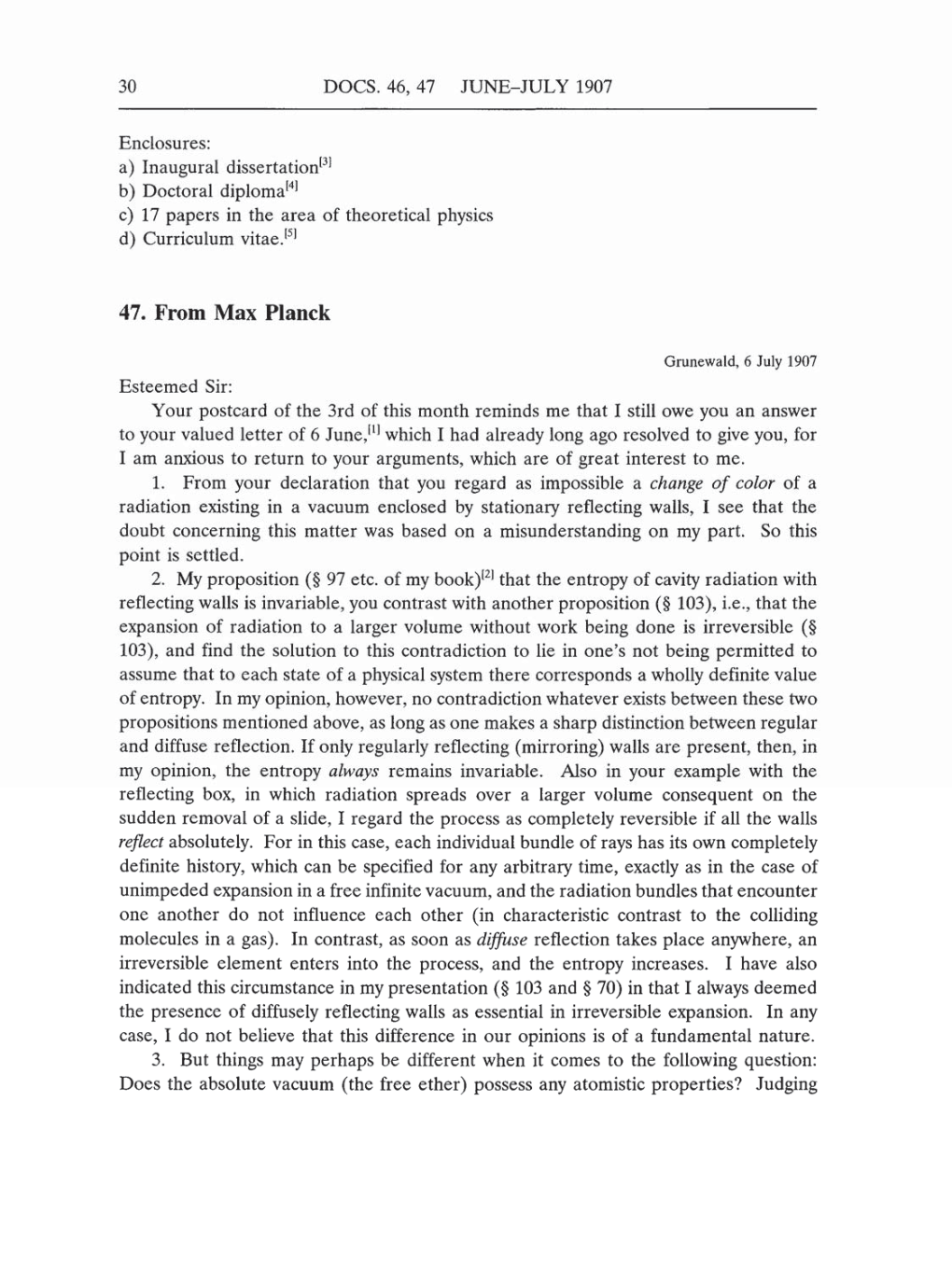30
DOCS.
46,
47
JUNE-JULY
1907
Enclosures:
a)
Inaugural
dissertation[3]
b)
Doctoral
diploma[4]
c)
17 papers
in
the
area
of theoretical
physics
d)
Curriculum
vitae.[5]
47.
From
Max
Planck
Grunewald, 6
July
1907
Esteemed
Sir:
Your
postcard
of the
3rd
of
this
month reminds
me
that
I still
owe
you
an answer
to
your
valued letter
of
6
June,[1]
which
I
had
already
long ago
resolved to
give you,
for
I
am
anxious to
return to
your
arguments,
which
are
of
great
interest
to
me.
1.
From
your
declaration that
you
regard
as
impossible
a
change
of color
of
a
radiation
existing
in
a vacuum
enclosed
by
stationary reflecting walls,
I
see
that
the
doubt
concerning
this
matter
was
based
on a
misunderstanding
on
my
part.
So this
point is
settled.
2.
My proposition
(§
97 etc.
of
my
book)[2]
that the
entropy
of
cavity
radiation
with
reflecting
walls
is invariable,
you
contrast
with
another
proposition
(§
103),
i.e.,
that
the
expansion
of radiation
to
a
larger
volume
without
work
being
done
is
irreversible
(§
103),
and find
the solution
to
this
contradiction
to lie in
one's
not
being
permitted to
assume
that
to
each
state
of
a physical system
there
corresponds
a wholly
definite
value
of
entropy.
In
my
opinion,
however,
no
contradiction whatever
exists
between these
two
propositions
mentioned
above,
as
long
as one
makes
a
sharp
distinction
between
regular
and
diffuse
reflection. If
only regularly reflecting (mirroring)
walls
are
present,
then,
in
my
opinion,
the
entropy
always
remains
invariable. Also in
your example
with the
reflecting
box,
in which
radiation
spreads
over
a
larger
volume
consequent
on
the
sudden removal of
a
slide,
I
regard
the
process
as
completely
reversible if all the walls
reflect
absolutely.
For
in this
case,
each
individual
bundle of
rays
has its
own completely
definite
history,
which
can
be
specified
for
any
arbitrary time,
exactly as
in
the
case
of
unimpeded expansion
in
a
free
infinite
vacuum,
and
the radiation bundles that
encounter
one
another
do not influence
each other
(in
characteristic
contrast to
the
colliding
molecules in
a gas).
In
contrast,
as soon as diffuse
reflection takes
place anywhere, an
irreversible element
enters into the
process,
and the
entropy
increases.
I
have also
indicated
this
circumstance
in
my
presentation
(§
103
and
§
70)
in
that
I
always
deemed
the
presence
of
diffusely reflecting
walls
as
essential in
irreversible
expansion.
In
any
case,
I do
not
believe
that
this
difference
in
our
opinions
is
of
a
fundamental
nature.
3.
But
things may
perhaps
be
different
when it
comes
to
the
following question:
Does the absolute
vacuum
(the
free
ether)
possess any
atomistic
properties?
Judging
